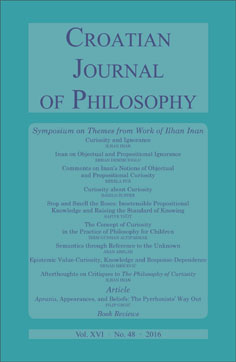Stop and Smell the Roses: Inostensible Propositional Knowledge and Raising the Standard of Knowing
Stop and Smell the Roses: Inostensible Propositional Knowledge and Raising the Standard of Knowing
Author(s): Safiye YiğitSubject(s): Epistemology, Ethics / Practical Philosophy, Philosophy of Mind, Philosophy of Language
Published by: KruZak
Keywords: curiosity; inostensible knowledge; gradability of knowledge;
Summary/Abstract: Ilhan Inan’s book The Philosophy of Curiosity is an exploration of understanding human curiosity and its relation to the use of language. He introduces the notion of inostensible reference (or reference to the unknown) that renders an interesting question possible. He claims that our aptitude for this kind of reference is what enables us to become aware of our ignorance and be curious. For him, there are two ways in which a proposition could be inostensible to a subject: one possibility is when the whole sentence’s truth value is unknown to the subject, the other possibility is when the subject knows the proposition to be true but does not know the fact that makes the proposition true, which he later calls inostensible knowledge. The former case requires an awareness of ignorance to generate curiosity, and the latter case requires an awareness of inostensibility of one’s knowledge to be conducive to curiosity. In this paper, what I would like to do is mainly to draw attention to the often neglected awareness of inostensible knowledge and explore its relation to curiosity. I also claim that, contrary to Inan’s idea that the only way of having inostensible knowledge is when there is at least one inostensible concept in the proposition, there is another possibility of inostensible knowledge, which would correspond to a case in which all the terms are ostensible to the speaker and the proposition is known to be true, but the proposition as a whole is still inostensible. I would like to argue that such an awareness of inostensibility of knowledge is a key step in evaluating one’s epistemic contact with reality and accordingly determining the degree of one’s knowledge on the epistemic scale. I believe this awareness will implicitly raise the standard of knowledge and hopefully foster curiosity, in its broader meaning of caring to know. I will further suggest that the acquisition of ostensible knowledge, which is a form of objectual knowledge of a fact, could also enable the corresponding proposition to be known better by the subject. This claim of mine might be thought of as an attempt to argue for the gradability of propositional knowledge, which has been a controversial issue in epistemology.
Journal: Croatian Journal of Philosophy
- Issue Year: XVI/2016
- Issue No: 48
- Page Range: 341-360
- Page Count: 20
- Language: English
- Content File-PDF

